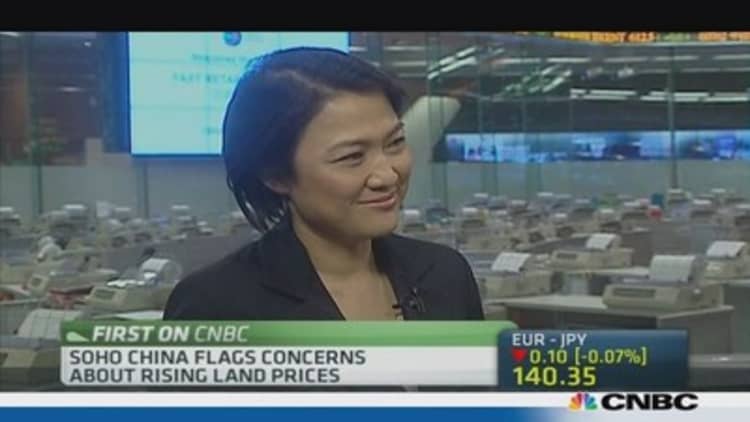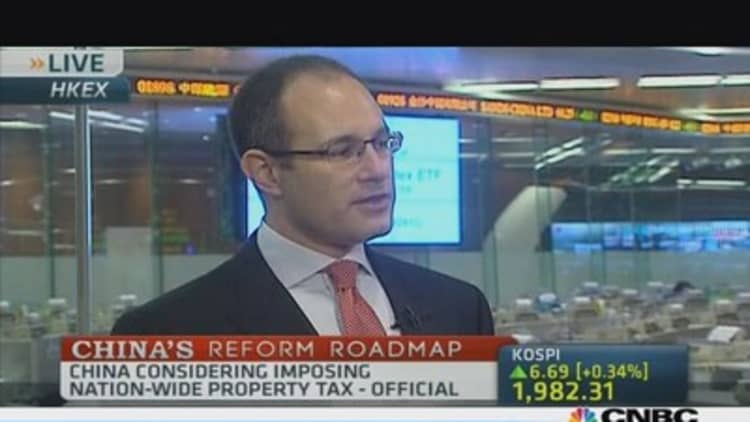
Against a background of runaway property prices combined with overdevelopment, China is planning a national property tax to rebalance the sector, with the blessing of many industry players.
"Up until now, if you own a property in China, there's no holding cost. If your home is sitting there empty -- you're not using it, you're not renting it out -- there's no penalty because you don't really feel hurt," said Zhang Xin, CEO of commercial property developer Soho China.
(Read more: The China risk you may have forgotten about)
"There's so many buildings being built and not really being occupied and not being utilized and so (introducing) the property tax will deal directly [with] that," she added.
The residential property market in China is a mass of contradictions: prices in many cities have surged, often becoming unaffordable for homebuyers, even as many apartments are scooped up by speculators and sit empty.

Occupancy data are hard to come by. In 2010, Chaoyang, Beijing's largest district, released data showing 1.33 million square meters of residential space was sitting vacant, with over half empty for at least three years, although it wasn't clear if the housing was unsold or unoccupied after being sold.
At the time, media reports said there were 64.5 million urban electricity meters registering zero consumption over a six-month period, but power companies denied the figures.
In the fourth quarter of last year, Shanghai and Beijing's high-end properties in the leasing market, including serviced residences, had occupancy rates around 80-92 percent, according to data from Savills Research.
(Read more: Is China's property sector facing a day of reckoning?)
In an attempt to rebalance the sector amid worries about a bubble, the government has implemented successive rounds of cooling measures, including local pilot programs to introduce property taxes. But those pilot programs have generally failed to effectively implement the tax amid resistance from local authorities.
Implementing the tax at the national level is a necessity, said Michael Klibaner, head of research for greater China at real-estate service provider, JLL, formerly known as Jones Lang LaSalle.
(Read more: Will a weaker yuan heighten China's property risks?)
"At a local level, at a provincial level, the property tax is clearly very unpopular," he told CNBC.
Other analysts have noted local officials and residents often don't want to reveal how many properties they actually own, which is key to implementing the tax. Part of implementing a national property tax would include creating a national database of property ownership.
The property tax is an important part of municipal finance reform, Klibaner said.
"Local governments get a significant amount of revenue from selling land use rights. Ultimately, that's a finite resource. They'll run out of land to sell," he said. "If residential doesn't produce annuity taxes, that's going to be a problem longer term."
The large pile of local government debt is seen as one of the biggest threats facing China's economy. China's state auditor said in late December that local governments had total outstanding debt of almost $3 trillion at the end of June last year.
(Read more: Can China contain high local government debt?)
In addition, the lack of a residential property tax is distorting the property market, Klibaner said.
"You have this local government incentive to oversupply commercial and undersupply residential," he said, noting commercial properties, such as shopping malls and offices, generate business taxes.
While the new property tax payers may be less than thrilled, industry players aren't expecting the introduction to hurt the sector much.
"The market has kind of digested that. It will come," said Soho China's Zhang. "What percentage is not clear, but everybody expects it will be gradual."
Keeping the property tax from grinding the sector to a halt will likely be a priority for the government due to its importance to the economy.
Capital Economics estimated that the property sector contributed 9.5 percent of China's gross domestic product (GDP) in 2013.
—By CNBC.Com's Leslie Shaffer; Follow her on Twitter @LeslieShaffer1

